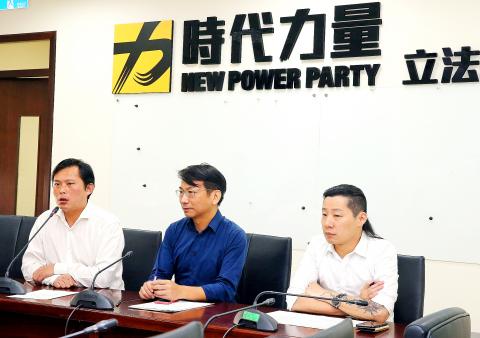The New Power Party (NPP) yesterday said it would push for amendments to the Referendum Act (公民投票法) to allow the public to vote on changing the Constitution and national territory, which it said are “the most important issues the public should be able to decide in a direct democracy.”
With the new legislative session set to begin on Friday, the NPP said that its priorities include amending the Referendum Act and the Act Governing Relations Between the People of the Taiwan Area and the Mainland Area (臺灣地區與大陸地區人民關係條例).
The party had proposed the same amendments in December last year, but they were vetoed by the Democratic Progressive Party (DPP) and the Chinese Nationalist Party (KMT).

Photo: CNA
Asked to comment on the DPP’s previous response, NPP Executive Chairman Huang Kuo-chang (黃國昌) said: “Why was the DPP brave enough to call for a referendum that would turn Taiwan into a normal nation when it was an opposition party, but abandoned the idea when it became the ruling party? By refusing to back the amendments, it ignored the most important issues people should be able to decide in a direct democracy, what the Referendum Act still owes the people.”
Whether people should be allowed to vote on the Constitution and national territory has been a subject of debate for more than 20 years, he said, adding that he hopes the DPP “would not make the same mistake again.”
The NPP will also promote amendments to the Act Governing Relations Between the People of the Taiwan Area and the Mainland Area that would strip Chinese residency cardholders of their household registration in Taiwan, NPP caucus whip Hsu Yung-ming (徐永明) said.
With more than 20,000 Taiwanese reportedly having applied for the card, the NPP would propose that they be allowed to keep their household registration if they cancel their card within a certain period, he said, adding that is likely to be two months.
Asked if the party would back a KMT proposal to abolish the Act on Promoting Transitional Justice (促進轉型正義條例) following a scandal involving the Transitional Justice Commission last week, Hsu said the party would oppose it, but that it supports a personnel reshuffle at the commission and the promotion of a lustration law.
Commission Chairman Huang Huang-hsiung (黃煌雄) is “incompetent” and must be removed from his position, Huang Kuo-chang said.
Instead of thinking about what he could have done better, he simply said he has not had time to read internal documents, Huang Kuo-chang said.
When asked about the scandal, Huang Huang-hsiung on Monday said that he had not had a chance to read most of the official documents until the middle of July and that it was not until last month that work finally got on track at the commission, which was founded in May.
Chang Tien-chin (張天欽) resigned on Wednesday last week as commission deputy chairman after the Chinese-language Mirror Media magazine published a transcript of a commission meeting on Aug. 24, in which he proposed promoting a lustration law to influence public opinion about KMT New Taipei City mayoral candidate Hou You-yi (侯友宜).

SECURITY: As China is ‘reshaping’ Hong Kong’s population, Taiwan must raise the eligibility threshold for applications from Hong Kongers, Chiu Chui-cheng said When Hong Kong and Macau citizens apply for residency in Taiwan, it would be under a new category that includes a “national security observation period,” Mainland Affairs Council (MAC) Minister Chiu Chui-cheng (邱垂正) said yesterday. President William Lai (賴清德) on March 13 announced 17 strategies to counter China’s aggression toward Taiwan, including incorporating national security considerations into the review process for residency applications from Hong Kong and Macau citizens. The situation in Hong Kong is constantly changing, Chiu said to media yesterday on the sidelines of the Taipei Technology Run hosted by the Taipei Neihu Technology Park Development Association. With

CARROT AND STICK: While unrelenting in its military threats, China attracted nearly 40,000 Taiwanese to over 400 business events last year Nearly 40,000 Taiwanese last year joined industry events in China, such as conferences and trade fairs, supported by the Chinese government, a study showed yesterday, as Beijing ramps up a charm offensive toward Taipei alongside military pressure. China has long taken a carrot-and-stick approach to Taiwan, threatening it with the prospect of military action while reaching out to those it believes are amenable to Beijing’s point of view. Taiwanese security officials are wary of what they see as Beijing’s influence campaigns to sway public opinion after Taipei and Beijing gradually resumed travel links halted by the COVID-19 pandemic, but the scale of

A US Marine Corps regiment equipped with Naval Strike Missiles (NSM) is set to participate in the upcoming Balikatan 25 exercise in the Luzon Strait, marking the system’s first-ever deployment in the Philippines. US and Philippine officials have separately confirmed that the Navy Marine Expeditionary Ship Interdiction System (NMESIS) — the mobile launch platform for the Naval Strike Missile — would take part in the joint exercise. The missiles are being deployed to “a strategic first island chain chokepoint” in the waters between Taiwan proper and the Philippines, US-based Naval News reported. “The Luzon Strait and Bashi Channel represent a critical access

Pope Francis is be laid to rest on Saturday after lying in state for three days in St Peter’s Basilica, where the faithful are expected to flock to pay their respects to history’s first Latin American pontiff. The cardinals met yesterday in the Vatican’s synod hall to chart the next steps before a conclave begins to choose Francis’ successor, as condolences poured in from around the world. According to current norms, the conclave must begin between May 5 and 10. The cardinals set the funeral for Saturday at 10am in St Peter’s Square, to be celebrated by the dean of the College